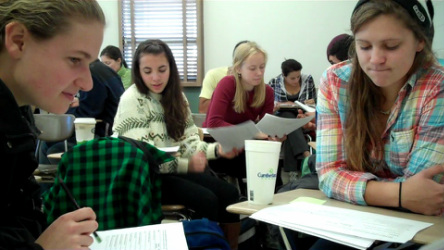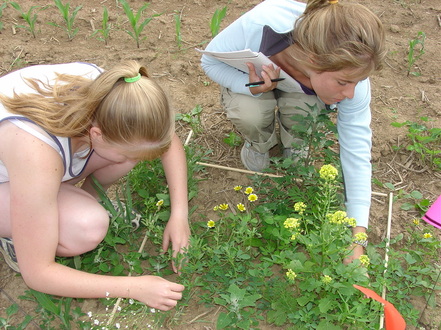Teaching Philosophy

Students work in collaborative groups in each class session.
As a teacher, I have three main goals that aim to foster student growth. First, I engage students by creating a learner-centered atmosphere so they can actively relate science to their lives. Second, I aim for students to be able to use quantitative reasoning and apply the process of science. Third, I strive to make students aware of resources and strategies that will allow them to achieve their goals when they leave my class.
Current Teaching Efforts
At the University of Wyoming, I enjoy teaching introductory and upper-level courses in the area of agroecology. Each Spring semester, I teach AECL 1000 Agroecology, our introductory course for Agroecology majors as well as for any university students looking to earn Physical and Natural Sciences (PN) credits for their general studies. It is an exciting mix of students with varying levels of experience in agriculture, capped at 50 students and consistently full enrollment. Students learn how to apply basic ecological concepts to agricultural systems with topics ranging from photosynthesis, food webs, nutrient cycling, disturbance, pest management, and the list goes on. The course includes a lab component taught by graduate TA's.
In Fall 2014, I taught a new course under PLNT 4790/5790 Topics called Cropping Systems Management and Ecology. The course included undergraduate and graduate students, and relied heavily on reading and analyzing recent scientific publications. Students applied their knowledge by completing an intensive farmer project, through which they responded to a local Wyoming producer's questions by researching the topics at hand and presenting their findings back to the producer at the end of the semester. Researching a real-world, current problem area for a specific producer was a "high stakes" assignment that motivated the students to contribute their best work. The project also strengthened ties between the university and its agricultural stakeholders.
I also coordinate our internship program. Agroecology majors are required to complete at least 1 internship, and they report on their experiences through the course AECL 4930 Internship, offered each semester.
Every other Fall (odd years) I teach a course as part of the University's adoption of a required First Year Seminar for all incoming students, under the PLNT 1101 designation. My course centers around the idea of "agricultural literacy." Students will explore the question, "Is eating an agricultural act?" (an obvious play on the famous Wendell Berry quote). They will be forced to confront their perceptions about food and agriculture with rigorous research on the topics of organic food, genetically-modified organisms, food safety, local food systems, and other topics depending on their interests.
In Fall 2014, I taught a new course under PLNT 4790/5790 Topics called Cropping Systems Management and Ecology. The course included undergraduate and graduate students, and relied heavily on reading and analyzing recent scientific publications. Students applied their knowledge by completing an intensive farmer project, through which they responded to a local Wyoming producer's questions by researching the topics at hand and presenting their findings back to the producer at the end of the semester. Researching a real-world, current problem area for a specific producer was a "high stakes" assignment that motivated the students to contribute their best work. The project also strengthened ties between the university and its agricultural stakeholders.
I also coordinate our internship program. Agroecology majors are required to complete at least 1 internship, and they report on their experiences through the course AECL 4930 Internship, offered each semester.
Every other Fall (odd years) I teach a course as part of the University's adoption of a required First Year Seminar for all incoming students, under the PLNT 1101 designation. My course centers around the idea of "agricultural literacy." Students will explore the question, "Is eating an agricultural act?" (an obvious play on the famous Wendell Berry quote). They will be forced to confront their perceptions about food and agriculture with rigorous research on the topics of organic food, genetically-modified organisms, food safety, local food systems, and other topics depending on their interests.
Mentoring

Mentoring students is a critical component of my research program.
Over the past decade, I have mentored 6 high school, 20 undergraduate students, and 2 graduate students in lab and field research experiences. I look forward to the opportunity to continue to mentor all levels of students, guiding them as they learn to conduct scientific research and interact with the public about environmental issues. It is important to me to do what I can to help students reach their goals.
Interested undergraduate students should contact me about research experience! There is the opportunity to receive credit through AECL 4920, to conduct research as work-study students, and to work part-time for pay seasonally and depending on available funds. We have a fun, welcoming work environment!
Interested undergraduate students should contact me about research experience! There is the opportunity to receive credit through AECL 4920, to conduct research as work-study students, and to work part-time for pay seasonally and depending on available funds. We have a fun, welcoming work environment!
